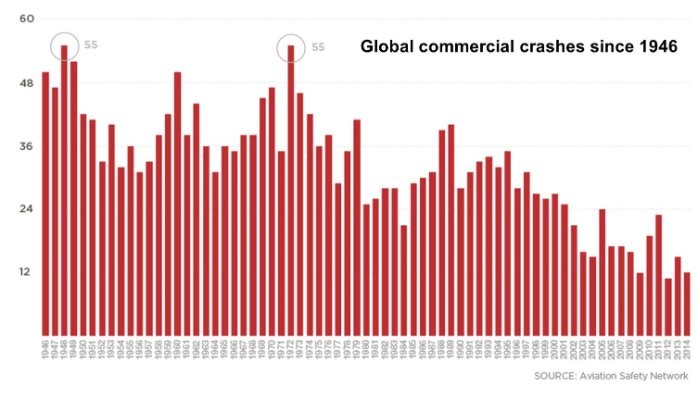
Fear of flying? Don't drive to the airport
High profile air disasters seem to be increasingly in the news these days. The crash of the Russian Airbus A321 a week ago follows the loss of the Germanwings A320 in March. So far this year 372 lives have been lost on commercial flights. Last year was worse. Three separate disasters caused 462 deaths in just one week in July: the shooting down of Malaysia Airlines Flight 17, the crash of a TransAsia Airways flight in Taiwan and the crash of AirAlgerie in Mali. Four months earlier, Malaysia Airlines MH370 disappeared with the loss of 239 passengers and crew.
Half of the UK population flies at least once a year and many of us fly a lot more. Our families worry about us cooped up in a metal cylinder, travelling 8 times faster than the legal road speed limit, 7 miles above solid ground, appearing to defy the laws of physics. We frequent flyers work, eat, sleep, watch films and, on some airlines, use the internet, barely noticing the world outside.
I flew from London to California this week. As we passed over the coast of Greenland I looked out of the window. Below us the land dropped into a frozen sea, a scattering of small icebergs breaking the surface. It looked cold out there, and it didn't seem that far away. If a problem with the plane forced us down, we would have zero chance of surviving. Was I perhaps being too dismissive about the risks of flying?
The deaths of over 700 passenger and flight crew globally in one year is of course a tragedy. The losses in 2014 were higher than the average in the last two decades, but there have been three years with even greater losses in the last ten years.
There has been a huge increase in passenger travel over the last 50 years, now with over 30 million commercial flights annually and increasing by almost 3% a year. Despite this, as the chart above shows, there is very clear evidence that commercial crashes are declining significantly. The total number of commercial crashes now is 25% of what it was in 1946 when there were a fraction of the commercial flights there are today. Flying has got alot safer.
And how does this compare to driving? Over twice as many people (1,700) were killed a year on the roads in the UK last year as died globally in air crashes. In the US 30,000 people died on the roads. How many people have died in flights leaving the UK in the last twenty years? None. Since the crash of the British Airtours flight at Manchester Airport in 1985 there has not been one single fatality from a commercial flight departing the UK.
Driving for one hour in a car is at least four times more dangerous than one hour in an aeroplane. Mile for mile flying is even safer. You are over 60 times more likely to die driving a car from London to Edinburgh than by flying. And over 2,000 times more likely on a motorbike. And the most dangerous part of the journey? For every one person that dies in the air, at least twice as many have died driving to the airport to catch a flight.
Furthermore, fear of flying may even increase fatalities. In 2002, following the terrorist attacks on the World Trade Center, air travel in the US dropped by up to 20% year as people took to the roads in preference to flying. Research has suggested that road fatalities then increased that year by almost 1,600 above the normal rate.
So those of us who are as familiar with the airport lounge as our own offices can rightfully assure our families that we do have a very good chance of landing in one piece. All I need now is for BA to introduce internet on its flights so I can send back photos of those icebergs in real time.
UK Recruitment Director at Aon
8y"You're more likely to get killed going to the airport, in a crash flying off a cliff, trapped under a gas truck.That's the worst." Christmas, L (1995)
CEO at Instech - insights from and for a network of 25,000 people driving innovation in insurance and risk management around the world. Podcast host. Board advisor.
8ySince writing this piece last year I have come across David Speigelhalter's informative article on the probability of having 3 plane crashes in 8 days (not as unlikely as it might appear). As Professor for the Public Understanding of Risk at the University of Cambridge he knows a bit about this kind of thing. http://goo.gl/ME6qQe
Award winning entrepreneur and world record breaking adventurer
8yHow very reassuring Mr Grant. Thank you.
Board Director | HR Leader | Financial Wellbeing | Payments | Payroll | Expenses | Charity Trustee
8yReassuring. I think